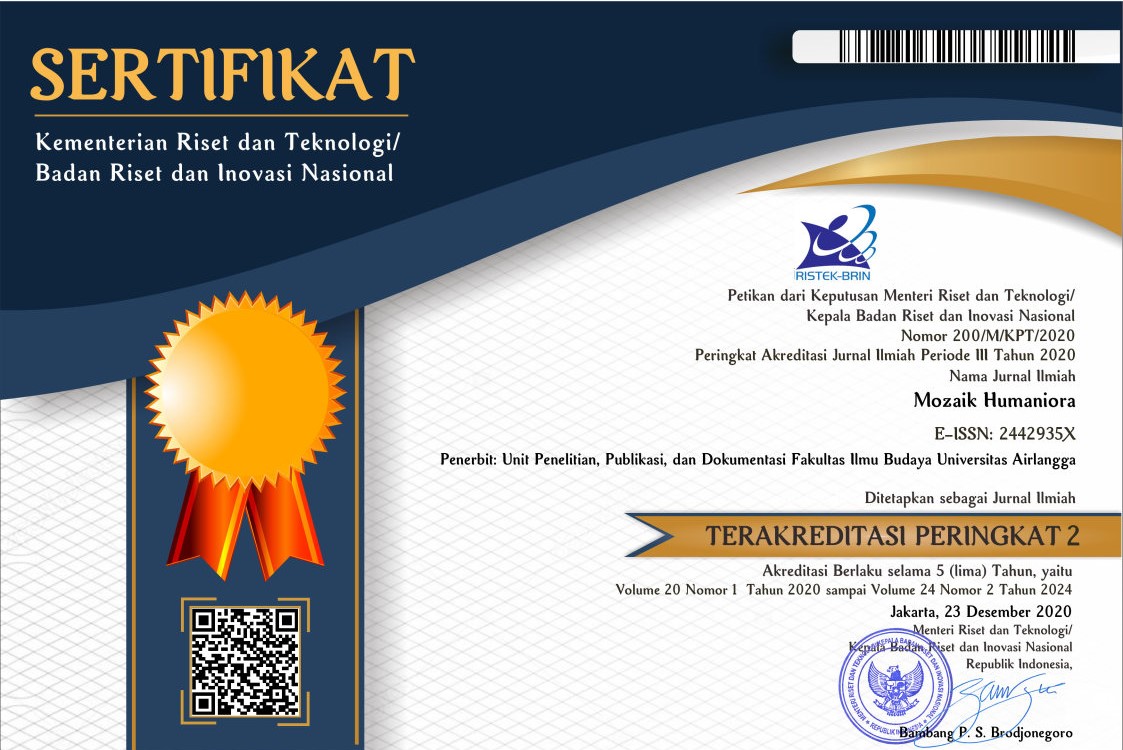Names and Naming in Online Thrift Shop Based on Linguistic Anthropological Perspective
Downloads
This study aims to examine names and naming in online thrift shops in Indonesia based on linguistic and anthropological perspectives. Names and naming as essential parts of language convey representation of an individual, object, places, etc. Names also have three categories in anthropological perspective, such as name and identity, roles of name, and name and culture. To pursue the goal of this study, qualitative descriptive method together with linguistic and anthropological perspectives was used. Next, purposive sampling technique was used to collect names of online thrift shops in Indonesia which have more than 500 followers on Instagram as criteria. In total, there were 50 names of online thrift shops in Indonesia collected. Interviewing all of the owners of online thrift shops selected then was conducted. The results showed that the owners of the selected online thrift shops have many considerations and reasons before choosing the suitable name for their small business, such as self-representation and social relationship with others. Those considerations represent the owner's self-identity. In conclusion, names of online thrift shops reveal an identity of the owner as well as the role of those names in the society.
Al-Zumor, Abdul Wahed Qasem Ghaleb. 2009. "A Socio-Cultural and Linguistic Analysis of Yemeni Arabic Personal Names." GEMA Online Journal of Language Studies 9 (2), 15-27.
Anderson, Claire. 2016. "What's in a Name? Sound Symbolism and Coffee Shop." Linguistic Senior Research Projects 4, 1-35.
Bacchielli, R. 2005. "Why Not What Our Curiosity about Names?" SLIN Newsletter 39, 6-25.
Bernstein, Ali and Maria Alban. 2020. "The Rise of Thrifting." https://fyou562225914.wordpress.com/2020/05/06/the-rise-of-thrifting/, May 6.
Boonpaisamsatit, Nithat. 2007. "Names and Naming: Semiotic, Linguistic, and Anthropological Perspectives." Journal of the Royal Anthropological Institute, 1-20.
Cooper, Katelyn M., Brian Haney, Anna Krieg, and Sara E. Brownell. 2017. "What's in a Name? The Importance of Students Perceiving that An Instuctor Knows Their Names in a High-Enrollment Biology Classroom." CBE Life Sciences Education 16 (1), 1-13.
Finke, Peter and Martin Sokefeld. "Identity in Anthropology." In The International Encyclopedia of Anthropology. Wiley-Blackwell.
Frege, G. "On Sense and Reference." 1982. The Philosophical Review 57 (3), 209-230.
Han, Jinhee. 2013. "Understanding Second-hand Retailing: A Resource based Perspective of Best Practices Leading to Business Success." Iowa: Iowa State University.
Herjanto, Halimin, Jean Scheller-Sampson, and Elisabeth Erickson. 2016. "The Increasing Phenomenon of Second-Hand Clothes Purchase: insights from The Literature." Jurnal Manajemen dan Kewirausahaan 18 (1), 1-15.
Hobbs, Robyn. "Understanding the Influencers of Second-Hand Apparel Shopping Behavior." Waterloo, Ontario: Wilfrid Laulier University.
Hochtritt, Lisa. 2019. "Art Educators Thrift Shopping Practices as Social Action." Studies in Art Education 60 (4), 303-316.
Leech, George. 1974. Semantics: The Study of Meaning. Harmondsworth: Penguin.
Lyons, John. 1995. Linguistic Semantic: An Introduction. Cambridge: Cambirdge University Press.
________. 1977. Semantic. Cambridge: Cambridge University Press.
Mitchell, Mark and Rob Montgomery. 2010. "An Examination of Thrift Store Shoppers." Marketing Management Journal, 94-107.
Nair, Nandhita. 2019. "Rise of Thrifting: Solution toFast Fashion or Stealing from the Poor." Berkeley Economic Review.
Ngade, Ivo. 2011. "Bakossi Names, Naming Culture and Identity." Journal of African Cultural Studies 23 (2), 111-120.
Noth, Winfried. 1990. Handbook of Semiotics. Indiana: Indiana University Press.
Russel, Bertrand. 1905. "On Denoting." Mind, 479-493.
Thomas, Anita Jones and Sara E. Chwarbaum. 2016. Culture and Identity: Life Stories for Counselor and Therapists. USA: SAGE Publication.
Umagandhi, R. and M Vinothini. 2017. "Leech's Seven Types of Meaning in Semantics." International Journal of Multidiciplinary Research and Development 4 (3), 71-71.
Valentine, Tim, Serge Bredart, Rebecca Lawson, and Geoff Ward. 1991. "What's in A Name? Acceess to Informasion from People's Name." European Journal of Cognitive Psychology, 147-176.
Watzalawik, Meike, et al. "First Names as Signs of Personal Identity: An Intercultural Comparison." Proceedings of the 10th World Congress of the International Association for Semiotic Studies. Spain: Universidade da Coruña, 2012. 1159-1176.
Wodon, Divya, Naina Wodon, and Quentin Wodon. "What Drives Client Satisfaction at Non-profit Thrift Stores." Nonprofit Research Project, 2013: 1-14.
Wulansari, Dwi Windah. "Padang Restaurant Names in Surabaya: A Linguistic Anthropology." Language Cirlcle: Journal of Language and Literature, 2020: 98-103.
Yunira, Sandra, Siska Pradina, Mathilda Sumbayak, Nunung Susilo Putri, and Tatum Derin. "Re-Visit the Grand Theory of Geoffrey Leech: Seven Types of Meaning." Journal of Research and Innovation of Language, 2019: 105-110.

Mozaik Humaniora is licensed under a Creative Commons Attribution-ShareAlike 4.0 International License. Both authors and Mozaik Humaniora agree with the following attribution of journal:
1. Copyright of this journal is possession of Author, by the knowledge of the Editorial Board and Journal Manager, while the moral right of the publication belongs to the author.
2. The journal allows the author(s) to retain publishing rights without restrictions
3. The legal formal aspect of journal publication accessibility refers to Creative Commons Attribution Share-Alike (CC BY-SA).
4. The Creative Commons Attribution Share-Alike (CC BY-SA) license allows re-distribution and re-use of a licensed work on the conditions that the creator is appropriately credited and that any derivative work is made available under "the same, similar or a compatible license”. Other than the conditions mentioned above, the editorial board is not responsible for copyright violation.


















